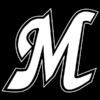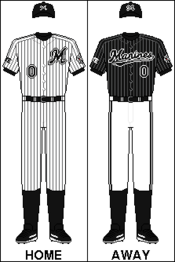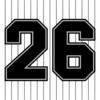Chiba Lotte Marines facts for kids
Quick facts for kids Chiba Lotte Marines |
|||||
|---|---|---|---|---|---|
| 千葉ロッテマリーンズ | |||||
|
|||||
| Information | |||||
| League | Nippon Professional Baseball
|
||||
| Location | Mihama-ku, Chiba, Chiba, Japan | ||||
| Ballpark | ZOZO Marine Stadium | ||||
| Year founded | November 26, 1949 | ||||
| Nickname(s) | Kamome (鴎, seagulls) | ||||
| PL pennants | 5 (1950, 1960, 1970, 1974, 2005) | ||||
| Japan Series championships | 4 (1950, 1974, 2005, 2010) | ||||
| Former name(s) |
|
||||
| Former ballparks |
|
||||
| Colors | Black, Grey, White |
||||
| Mascot | Mar-kun, Rine-chan, and Zu-chan | ||||
| Playoff berths | 14 (1974, 1977, 1980, 1981, 2005, 2007, 2010, 2013, 2015, 2016, 2020, 2021, 2023, 2024) | ||||
| Retired numbers | |||||
| Ownership | Katsumi Kawai | ||||
| Management | Lotte Holdings | ||||
| Manager | Masato Yoshii | ||||
| President | Shunsuke Kosaka | ||||
| Uniforms | |||||
|
|
|||||
The Chiba Lotte Marines are a professional baseball team from Japan. They play in the Pacific League, which is part of Nippon Professional Baseball. The team is based in Chiba City, Japan. Lotte Holdings owns the team.
The Marines started in 1950 as the Mainichi Orions. They were one of the first teams in the Pacific League. In their very first year, they won the 1950 Japan Series. Since 1992, their home stadium has been ZOZO Marine Stadium. It is located in Chiba and can hold over 30,000 fans. The team's name "Marines" comes from their stadium. It used to be called Chiba Marine Stadium because it is right by the ocean.
Contents
Team History and Wins
The Marines team began in 1950 as the Mainichi Orions. They were owned by the Mainichi Shimbun newspaper. The Orions were named after the Orion constellation. They won the first-ever Japan Series in 1950.
Name Changes and Early Success
In 1958, the team joined with another team, the Daiei Unions. They became the Daimai Orions. This name showed that both Daiei and Mainichi owned the team. Later, they changed their name to the Tokyo Orions in 1964. In 1969, they became the Lotte Orions. The team reached the Japan Series again in 1960 and 1970, but they lost both times.
The team played in central Tokyo until 1972. From 1973 to 1977, the Lotte Orions played in Sendai. In 1974, they won the Japan Series again. They beat the Chunichi Dragons. This was a big win for the Pacific League. After their victory, the owners held the parade in Tokyo. This surprised fans in Sendai and caused attendance to drop.
Star Players and New Home
In 1977, the Orions signed Major League Baseball player Leron Lee. He played for the team for eleven seasons. He had a great batting average of .320. He also hit 283 home runs. In 1978, Leron's younger brother, Leon Lee, joined the team. The two brothers were a powerful hitting duo for five seasons.
In 1978, the team moved back to the Tokyo area. They played at Kawasaki Stadium in Kawasaki.
Becoming the Chiba Lotte Marines
In 1992, the team moved to Chiba City. They started playing at Chiba Marine Stadium. Fans voted for a new team name. "Dolphins" and "Pirates" were popular choices. However, "Marines" was chosen in the end. The team thought "Marines" meant "heroes of the sea." This gave the team its current name, Chiba Lotte Marines.
The team's logo changed over time. It first used pink, blue, and white. It showed a pirate ship and a seagull. In 1995, the logo changed to its current design. It features a baseball with a soaring seagull. The team's name is around the circle.
Recent Japan Series Victories
The team did not reach the Japan Series again until 2005. The Marines started the 2005 season in first place. They were led by American manager Bobby Valentine. They later fell behind the Fukuoka SoftBank Hawks. However, the Marines defeated the Hawks in the Pacific League playoffs.
The Marines then went to the 2005 Japan Series. This was their first time in the tournament since 1974. They swept the Hanshin Tigers in four games. They scored ten runs in each of the first three games. After this, the Marines also won the Konami Cup Championships. They beat South Korea's Samsung Lions.
In 2010, the Marines finished third in their league. This earned them a spot in the Climax Series playoffs. They became the first third-place team to win the Climax Series. They then faced the Chunichi Dragons in the 2010 Japan Series. The Marines won the series in seven games. This was their second Japan Series win in less than ten years.
Playoff Appearances
The Marines have made the playoffs many times. In 2013, they reached the Climax Series. They won the first stage but lost in the final stage. They also made the playoffs in 2015 and 2016. In both years, they were defeated by the Fukuoka SoftBank Hawks.
In 2020, they returned to the playoffs. The Hawks swept them again in the first stage. In 2021, they defeated the Eagles in the first stage. However, they were swept by the Orix Buffaloes in the final stage.
On April 10, 2022, Rōki Sasaki pitched a perfect game. This was the first perfect game in Japan in 28 years. Sasaki struck out 19 batters, tying a record. He also set a new record by striking out 13 batters in a row.
In 2023, the Marines finished second in their league. They defeated the Hawks in the first stage of the playoffs. But they lost to the Buffaloes in the final stage.
Current Roster
|
Chiba Lotte Marines roster
|
|||||||
|---|---|---|---|---|---|---|---|
| First squad | Second squad | ||||||
|
Pitchers
Catchers
|
Infielders
Outfielders
Manager
Coaches
|
Pitchers
Catchers
|
Infielders
Outfielders
Manager
Coaches
|
||||
| Development Players | |||||||
|
|||||||
| Updated November 10, 2022 | → All NPB rosters | ||||||
Notable Former Players
 Benny Agbayani
Benny Agbayani Hiromitsu Ochiai
Hiromitsu Ochiai Alfredo Despaigne
Alfredo Despaigne Mike Diaz
Mike Diaz Jose Fernández
Jose Fernández Julio Franco
Julio Franco Matt Franco
Matt Franco Mel Hall
Mel Hall Isao Harimoto
Isao Harimoto Baek In-chun
Baek In-chun Pete Incaviglia
Pete Incaviglia Hideki Irabu
Hideki Irabu Kazuya Fukuura
Kazuya Fukuura Masaaki Kitaru
Masaaki Kitaru Kiyoshi Hatsushiba
Kiyoshi Hatsushiba Masahide Kobayashi
Masahide Kobayashi Tsuyoshi Nishioka
Tsuyoshi Nishioka Satoru Komiyama
Satoru Komiyama Bill Madlock
Bill Madlock Leon Lee
Leon Lee Leron Lee
Leron Lee Choji Murata
Choji Murata Jim Lefebvre
Jim Lefebvre Darryl Motley
Darryl Motley Bill R.W. Murphy
Bill R.W. Murphy Yuhei Nakaushiro
Yuhei Nakaushiro Katsuo So
Katsuo So Kazuhiro Yamauchi
Kazuhiro Yamauchi Akihito Igarashi
Akihito Igarashi Michiyo Arito
Michiyo Arito Saburo Omura
Saburo Omura Tomohiro Kuroki
Tomohiro Kuroki Katsuya Nomura
Katsuya Nomura Tomoya Satozaki
Tomoya Satozaki Dan Serafini
Dan Serafini Lee Seung-yuop
Lee Seung-yuop Naoyuki Shimizu
Naoyuki Shimizu Kim Tae-kyun
Kim Tae-kyun Norifumi Nishimura
Norifumi Nishimura Shunsuke Watanabe
Shunsuke Watanabe Julio Zuleta
Julio Zuleta Frank Bolick
Frank Bolick Derrick May
Derrick May Rick Short
Rick Short Brian Sikorski
Brian Sikorski José Castillo
José Castillo Chen Kuan-yu
Chen Kuan-yu Chen Wei-Yin
Chen Wei-Yin Luis Cruz
Luis Cruz Toshihide Narimoto
Toshihide Narimoto Makoto Kosaka
Makoto Kosaka Koichi Hori
Koichi Hori Adeiny Hechavarria
Adeiny Hechavarria Leonys Martín
Leonys Martín Hiroyuki Yamazaki
Hiroyuki Yamazaki Yukinaga Maeda
Yukinaga Maeda Kazuhiko Ushijima
Kazuhiko Ushijima Tadahito Iguchi
Tadahito Iguchi Hideaki Takazawa
Hideaki Takazawa Kihachi Enomoto
Kihachi Enomoto Luis Perdomo
Luis Perdomo Eric Hillman
Eric Hillman Roki Sasaki
Roki Sasaki
Players Who Played in MLB
- Roki Sasaki (played in MLB starting 2025)
- Dallas Keuchel (played in MLB until 2024)
- Hirokazu Sawamura (played in MLB 2021–2022)
- Hideki Irabu (played in MLB 1997–2002)
- Masato Yoshii (played in MLB 1998–2002)
- Satoru Komiyama (played in MLB 2002)
- Tadahito Iguchi (played in MLB 2005–2008)
- Masahide Kobayashi (played in MLB 2008–2009)
- Tsuyoshi Nishioka (played in MLB 2011–2012)
- Ryohei Tanaka (played in MLB 2009–2011)
- Yasuhiko Yabuta (played in MLB 2008–2009)
- Shunsuke Watanabe (played in MLB 2014)
- Yuhei Nakaushiro (played in MLB 2016–2018)
Honored Number
|
- Number 26 – This number was retired in 2005 to honor the Marines' fans. It's like saying the fans are the "26th player" on the team. Other sports teams also do this to show appreciation for their supporters.
Team Managers
The Chiba Lotte Marines have had many managers throughout their history. Here are some of them:
| No. | Years in office |
Managers | W | L | T | Win% | Pacific League championships |
Japan Series championships |
|---|---|---|---|---|---|---|---|---|
| 1 | 1950–1951 | Yoshio Yuasa | 135 | 85 | 10 | .614 | 1 (1950) | 1 (1950) |
| 4 | 1954–1959 | Kaoru Betto (2nd) | 467 | 341 | 26 | .578 | ||
| 5 | 1960 | Yukio Nishimoto | 82 | 48 | 3 | .631 | 1 (1960) | |
| 10 | 1968–1970 | Watarui Nonin | 216 | 164 | 19 | .568 | 1 (1970) | |
| 13 | 1973–1978 | Masaichi Kaneda (1st) | 374 | 339 | 67 | .525 | 1 (1974) | 1 (1974) |
| 24 | 2004–2009 | Bobby Valentine (2nd) | 425 | 392 | 20 | .520 | 1 (2005) | 1 (2005) |
| 25 | 2010–2012 | Norifumi Nishimura | 191 | 213 | 28 | .472 | 1 (2010) | |
| 28 | 2023–present | Masato Yoshii | 141 | 134 | 11 | .512 |
Cheer Dancers and Mascots
The Marines have a cheerleading squad called M☆Splash!!. They started in 2004. They perform during games with the team's mascots. There are 27 members in the squad.
Team Mascots
- Mar-kun (マーくん) is the main mascot for the Marines.
- Rine-chan (リーンちゃん) is Mar-kun's girlfriend.
- Zu-chan (ズーちゃん) is Mar-kun's younger brother.
These three mascots entertain fans at every game. Their names come from parts of the team's name.
- Mysterious Fish (謎の魚) was a mascot introduced in May 2017. It was a strange fish with legs. This mascot retired after the 2021 season.
- When the team was the "Lotte Orions," their mascot was called Bubble-Boy. He only appeared as a logo.
- In 2005, the Marines also had a penguin mascot named Cool-kun. He was known for his amazing acrobatic stunts. Cool-kun retired in 2016.
Minor League Team
The Marines also have a minor league team. This team plays in the Eastern League. It was founded in 1950 as the Mainichi Glitter Orions.
See also
 In Spanish: Chiba Lotte Marines para niños
In Spanish: Chiba Lotte Marines para niños
- Lotte Giants
- Lotte Group
 | Tommie Smith |
 | Simone Manuel |
 | Shani Davis |
 | Simone Biles |
 | Alice Coachman |





